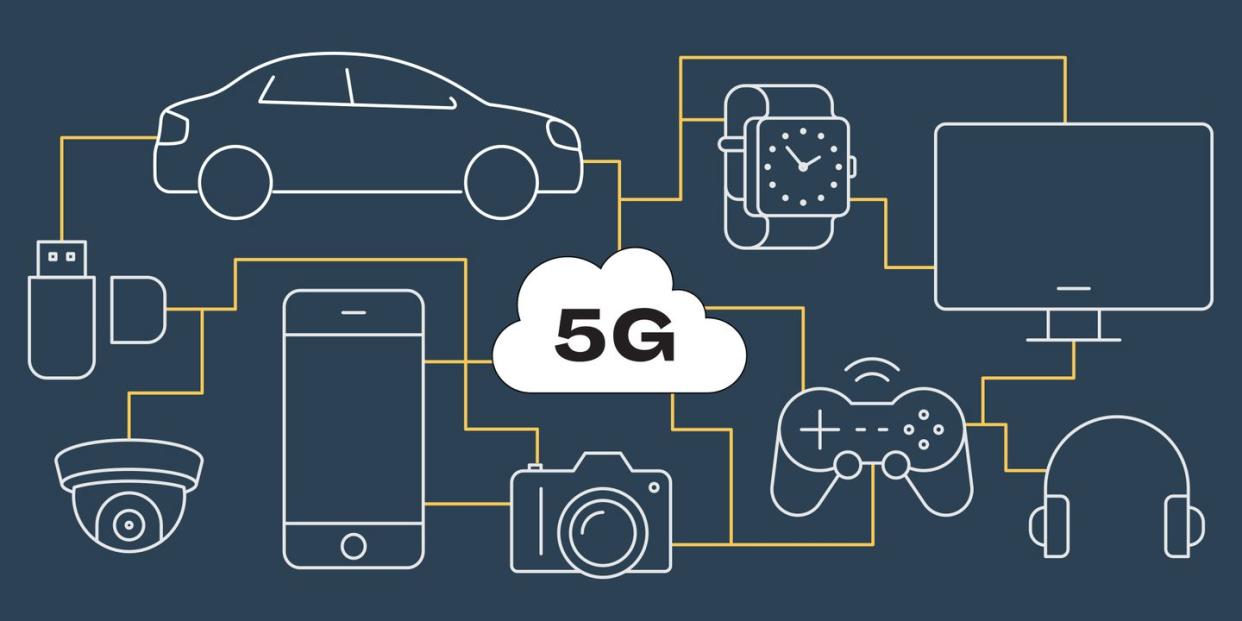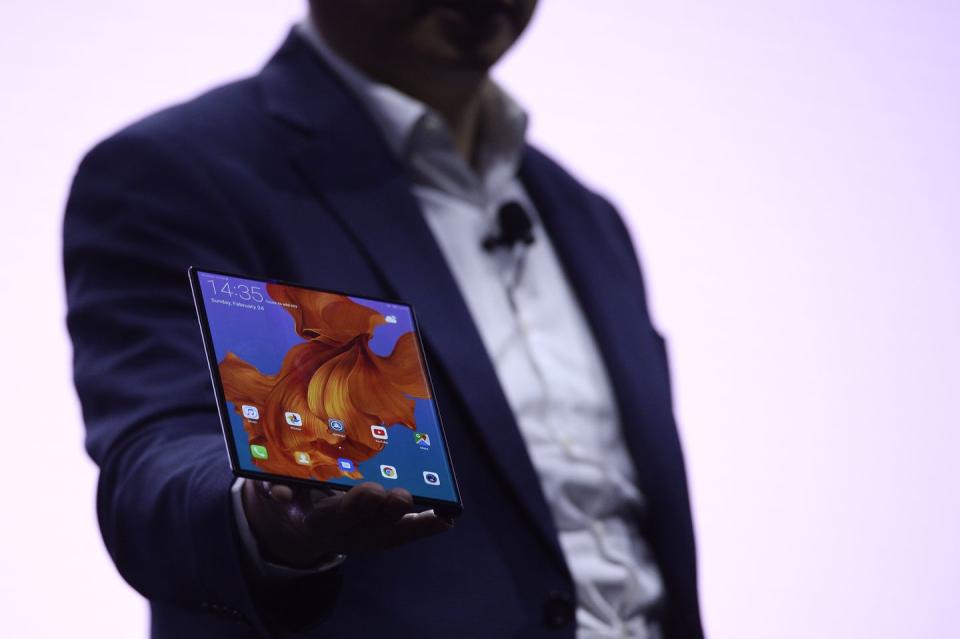5G Is Coming. Here's Everything You Need to Know About It.

The 5G whispers started last year. Now they're a battle cry. This fifth generation of networking is about to radically change how we communicate with each other and our devices-or so all the big phone carriers and network suppliers shout. The reality is a bit more complicated.
How did we get to 5G? Numerically, of course. First there was 2G, which was introduced in 1991. When the first iPhone burst onto the scene, we were working with 3G, getting our first taste of video playback to go along with our calls and texting. People said we'd never need more. But almost 10 years ago, carriers made the leap to 4G, also called LTE, so we could run multiple apps, stream video, and more. Again, people said we'd never need more, that 4G fit the bill.
Now we're connected to even more devices with the eventual goal of being connected to, no joke, everything. The Internet of Things is in our doorbells, on our nightstands, driving our cars, and cooking our food. The world is too smart for 4G. It's time to up the network ante. Evolution marches forward.
To prep ourselves for the supposed 5G takeover, we talked to Doug Murray, the CEO of Big Switch Networks, a software networking company, who's been "living and breathing" the network ecosystem for more than 20 years. Here's what is most important to know right now.

What are the benefits of 5G?
5G is going to be fast as hell. With the additional bandwidth it provides, estimates put its peak speed at 20 times faster than the 4G networks we're chugging along on right now-and 4G isn't even that slow. So speed is the obvious benefit.
"We have a lot of millennials and folks who've never had a landline, and so 5G's so powerful that you might be able to not even have a cable internet service, if you don't want to," Murray says. "If you're running Hulu and a bunch of other apps, you could just do it directly from whatever mobile device you're using."
How will 5G get to you?
Your city might already have the groundwork laid for 5G, if you live in a big city. This map can give you an idea where 5G coverage is currently available and where it's going to next. It also depends on your carrier, all of which are rabidly competing against each other for 5G dominance.
Verizon rolled out a 5G hotspot service for homes in a handful of cities last year, and it's adding 5G coverage for mobile phones this year.
AT&T launched 5G in 12 cities last year and is adding more cities as we speak.
Sprint is trying to get 5G coverage to its users in nine cities by May.
T-Mobile says it'll have 5G coverage in 30 cities by the end of 2019, but won't have full 5G coverage until 2020.
America will be one of the countries leading the switch to 5G-it's always at the forefront of technological advances-and it's easy for us to take that for granted. When people travel abroad to countries that still have 3G, they will quick realize the difference in speed, according to Murray. And keep in mind that there are some pockets of America that don't even have 4G yet.
Does 5G matter to you in 2019?
Short answer: No. It's coming soon, but it isn't coming this year. Murray pegs the date that most phones and devices will be on the 5G network as 2020 or 2021. Another estimate from TrendForce has 5G infrastructure completion marked down for 2022.

So, 5G smartphones. Are they worth the price tag?
It's the year of 5G smartphone reveals. Samsung introduced its first 5G phone, the Galaxy S10 5G, which will probably cost more than a thousand bucks. Huawei's Mate X will run on the 5G network-it also folds, if you really want to catapult into the future-and costs $2,600 to start. The new Xiaomi Mi Mix 3 and LG V50 ThinQ are 5G machines. And surely, Apple is cooking up its own 5G device.
It may be the year of 5G smartphone reveals, but it is not the year for smart, budget-conscious consumers to buy them-not when 5G is barely available around the world, and the network has barely been tested on a mass consumer level. But the companies laying down 5G infrastructure around the world have a "if you build it, they will come" mentality. They're building the system, and on their heels are the smartphone manufacturers and network carriers with their shiny new devices and fancy data package plans. Soon enough, but not too soon, it'll be time to upgrade your smartphone.
Why are cell phone companies already marketing them?
To get you to buy more shit, of course. But it also ensures that 5G keeps spreading. "This whole ecosystem has to actually work together, because if we as networking companies built amazing infrastructure and can delivery 5G, but the phones can't adhere to the standard and get the benefit of it, then what's the point of doing it?" Murray explains.
What can 5G do besides revolutionize phones?
Pick an initialism-or a gadget it seems like Elon Musk would be super into-and it will be benefited by 5G. AR, VR, AI, IOT. Self-driving cars. Smart home plugs and speakers and hubs. All of these will run more seamlessly, more quickly, and more integrated into your life and with each other as a result of 5g.
"Envision everything you touch and interact with every day becoming more and more like Iron Man," Murray says. "And that's, to me, where it gets so exciting."
He continues with this example of a 5G scenario: "Say you have a BMW. It's going back to a data center running a lot of analytics. It could start telling you things such as, 'Hey, statistically because of the altitude that you've driven, the temperature, and the amount of snow, your tires will need to be replaced earlier than previously though. Please consider seeing a dealer.' And it starts to signal things back and forth to the vehicle."

What's the risk?
More connection with more devices and more people means, well, more connection. And that's not always a good thing, especially if you value privacy and expect to live your life relatively surveillance-free. Surveillance itself will become more powerful. Companies will increasingly interact with consumers. Cities will get smarter. And the issues we have with companies like Amazon and Google handling our data now won't be solved on a 5G network.
What about Huawei?
The Chinese company Huawei-you might know them from their phones, which the head of the CIA, FBI, and NSA recommend against buying-is a global leader in 5G. It's already one of the biggest communications companies in the world; it sells more phones in China than Apple does, Murray points out. And it's competing to win contracts to build 5G networks in other countries. The U.S. government is freaked out by Huawei.
"I think it's very interesting when it turns to become a more geopolitical thing as opposed to a technological thing," Murray says.
But the fact remains that Huawei is the biggest comms company in the biggest country, and it's making headway in supplying 5G around the world. At this point, just knowing its name is a good start.
How long will we be running on 5G?
Murray estimates that 5G has a 10-year lifespan, much like 4G's.
What comes after 5G?
Duh: 6G. "There are some early discussions that people have had where, I know it's cheesy to say this, but that literally 6G is what they're mapping," Murray says.
And just like once upon a time imagining 5G was nearly impossible as our devices zoomed along on 4G, it's hard to describe what it will be able to do from where we stand here in the year 2019.
('You Might Also Like',)

